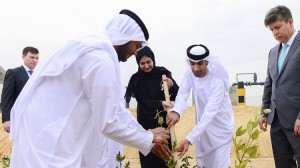Masdar Institute is celebrating the successful opening of its new research facility that will grow food and produce fuel in desert lands irrigated by seawater. The facility is located on a 2-hectare site in Abu Dhabi, United Arab Emirates and is funded by the Sustainable Bioenergy Research Consortium (SBRC), a group dedicated to advancing the use of sustainable jet fuels.

SBRC officials and guests participate in mangrove plantation at the new SEAS facility. From right: Dr Alejandro Rios G., SBRC Director, HE Dr. Thani Ahmed Al Zeyoudi, UAE Minister of Climate Change and Environment, Dr. Behjat Al Yousuf, Interim Provost, Masdar Institute, and Mohammed Al Ghailani, student at Masdar Institute.
“We live in a resource-constrained world where the access to energy, water and food are interlinked,” said Dr. Behjat Al Yousuf, Interim Provost of Masdar Institute, a research-based university in Abu Dhabi, and a founding member of SBRC whose organization will be operating the R&D facility. “Public-private collaboration to support cutting-edge research is needed to ensure that rising populations and industry can flourish sustainably, while, at the same time, also protect our finite resources. This project has the potential to turn resource scarcity on its head.”
The research facility is using coastal seawater to raise fish and shrimp for food (Aquaculture is one of the world’s fastest growing industries at six percent per year), whose nutrient-rich wastewater then fertilizes plants rich in oils that can be harvested for aviation biofuel production such as halophyte plants. These plants thrive in arid, desert conditions and don’t require fresh water or arable land, but according to Masdar Institute, the plant’s commercial potential is relatively unexplored. The final step in the process is diverting the wastewater to a cultivated mangrove forest, that further removes nutrients and provides carbon storage before the naturally filtered water and treated effluent flows back into the sea.
“By doing research on integrated food and energy systems, we can begin to explore how the cultivation of biomass contributes to feeding the planet, preserving fresh water supplies and delivering cleaner, more sustainable fuels,” said Dr. Al Yousuf. “This research is very relevant for the UAE and all freshwater- and arable land-constrained countries.”
Marc Allen, president of Boeing International, once of the founding SBRC members, added, “The aquaculture and biomass facility in Abu Dhabi holds tremendous promise to turn the 25.5 million square kilometers of desert and arid areas of the world into productive farmland, supporting both food security and cleaner skies.”

